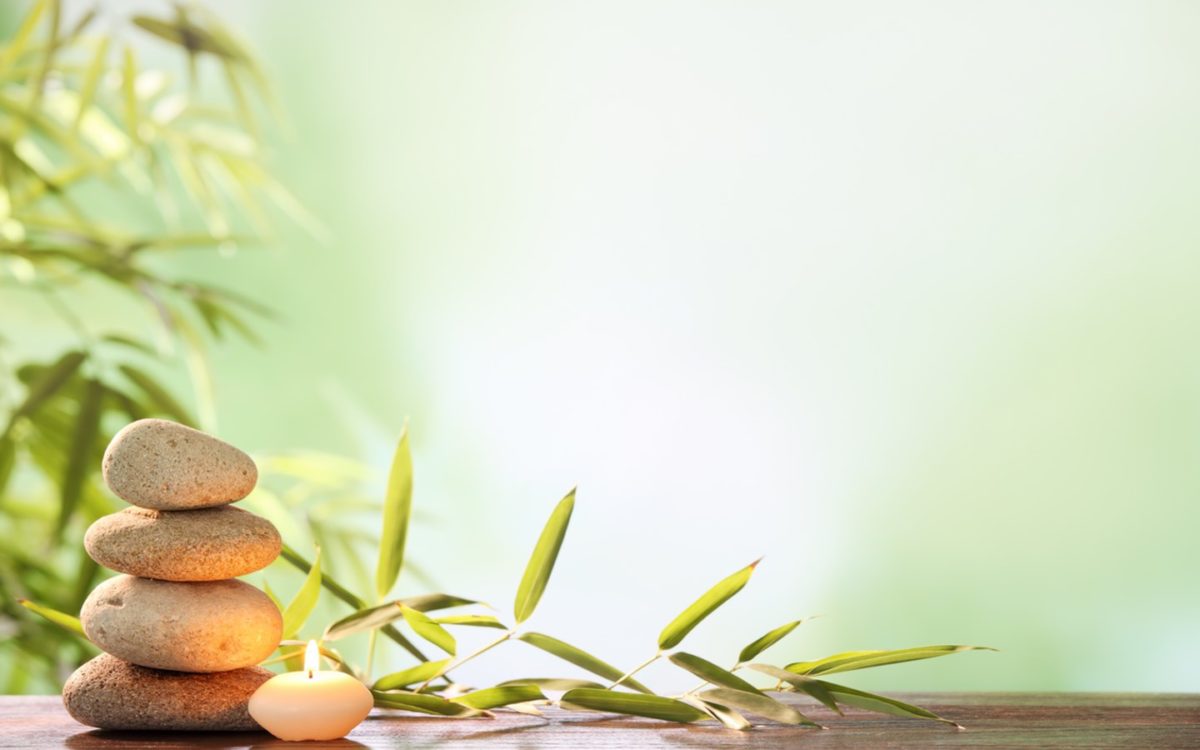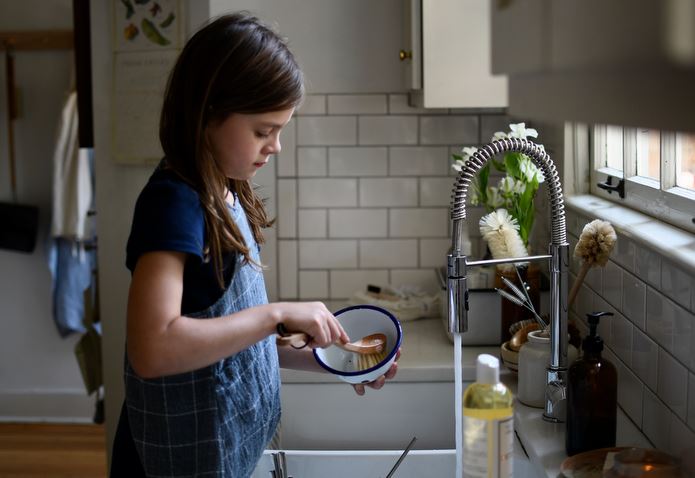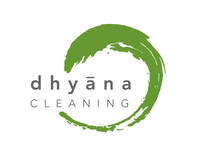In our multi-tasking, fast paced world, it would probably be difficult to find someone who doesn’t juggle a multitude of things to get done while doing other things. There is perhaps a time for this sort of scattered attention: cooking dinner while putting dishes away and helping a child with homework is a common experience—there are only so many hours in a day.
That coupled with the COVID-19 restrictions that have forced so many to wear different hats at the same time in the same space: boss, parent, employee, partner, spouse, friend, and so many more, it is no wonder that we find ourselves feeling overwhelmed and like there is still so much more to do.
Mindfully Avoiding Burnout
Katie Shulist, founder and CEO of Dhyana Cleaning, a successful and sought-after green cleaning services provider in Toronto, Ontario says that by using her mindful cleaning method, one can manage their energy, not just their time and move towards a more fulfilling life. This is done in part by becoming more skillful in the cleaning process, but also by using cleaning as an opportunity to be grounded in the present moment.
Over Katie’s almost 2 decades of experience as a social entrepreneur and a professional cleaner, she has developed some important insights regarding the many opportunities cleaning provides for developing mindful attention to one’s thoughts, ego, and physicality. Reading about Buddhist and Yogic philosophy led Katie to realize that she was doing the same sorts of introspection and mindful attention when she was working as a cleaning professional.
This inspired Katie to develop a program that could help others access the kind of mindful cleaning practice she knows is accessible to all of us. Katie says, “it is within our practice that we come to realize our boundaries are self-imposed, that anything is possible with the right mindset.”
Mastering Mindset
If we want to become more efficient and focused, we can do so by creating the right mindset, which can often be honed through meditation practice. Neuroscientists who study the effects of meditation on the brain have found that meditation not only affects change at the behavioural level, but at the level of brain functioning as well. In a 2018 study conducted by Benjamin Schöne et al, they found “that mindful breath awareness meditation may lead to refinements of attention networks, enabling more efficient use of attentional resources.”
In a social world where multitasking is not only valued, but often a sought-after skill in various forms of employment, learning to have more efficient use of our attentional resources may look differently than we think. Rather than becoming improved multitaskers, we are better able to begin a task and see it through to its end with more accuracy and focus (Adler & Benbunan-Fich, 2012).
More than rushing through the cleaning process to simply get it done, Katie’s mindful cleaning is one that engages body, mind, and spirit. Cleaning is a physical task, one that is bolstered by using “effective and efficient systems to clean skillfully.” Next, says Katie, we shape our experiences with our attitude and mindset. The mental experience of the cleaning process is very important. If we look at cleaning as a menial task that is somehow beneath us, it will not serve our mental states.
But if we look at cleaning as an opportunity to come back to the body, to breathe with awareness, to have concern for the products we use for our own health and that of the environment and we see cleaning as an opportunity to check in, to be real with our emotional and physical states, we can begin to see it in a different light. And that different light is one of having a spirit open to providing service, whether just for yourself or for all beings that live in your home.
Fine Tuning Attention
In a study done by Kathleen G. Burger et al (2017) mindfulness meditation was shown to improve executive attention “which is the type of cognitive processing required under technically difficult conditions involving critical decision making, trouble shooting, and prioritizing one's attention among competing stimuli” (Burger et al, 2017).
Mindful cleaning, like mindful walking or mindful movement is a practice that can help to develop such focus (Crivelli et al. 2019). Given all the many competing items for our attention, especially since the COVID-19 restrictions, a practice that can support prioritizing attention in a skillful manner can be quite beneficial.
Many Benefits of a Mindful Cleaning Practice
Many people are interested in meditation for a variety of reasons, not the least of which include gaining a deeper sense of self-awareness and emotional resilience to help avoid burnout. Through Katie’s practice of mindful cleaning, there are the overlapping benefits of positively affecting your space by creating a clean and ordered environment alongside a deepening of our self-awareness.
As Katie says, “my aim is to create an environment that enables you to deepen your connection to all of life, and open to transformation within yourself.” By using Katie’s mindful cleaning principles as outlined in her Clear Mind course, we learn to transform the world around us by transforming the world within. Want to try Katie’s course? Contact her at [email protected].
That coupled with the COVID-19 restrictions that have forced so many to wear different hats at the same time in the same space: boss, parent, employee, partner, spouse, friend, and so many more, it is no wonder that we find ourselves feeling overwhelmed and like there is still so much more to do.
Mindfully Avoiding Burnout
Katie Shulist, founder and CEO of Dhyana Cleaning, a successful and sought-after green cleaning services provider in Toronto, Ontario says that by using her mindful cleaning method, one can manage their energy, not just their time and move towards a more fulfilling life. This is done in part by becoming more skillful in the cleaning process, but also by using cleaning as an opportunity to be grounded in the present moment.
Over Katie’s almost 2 decades of experience as a social entrepreneur and a professional cleaner, she has developed some important insights regarding the many opportunities cleaning provides for developing mindful attention to one’s thoughts, ego, and physicality. Reading about Buddhist and Yogic philosophy led Katie to realize that she was doing the same sorts of introspection and mindful attention when she was working as a cleaning professional.
This inspired Katie to develop a program that could help others access the kind of mindful cleaning practice she knows is accessible to all of us. Katie says, “it is within our practice that we come to realize our boundaries are self-imposed, that anything is possible with the right mindset.”
Mastering Mindset
If we want to become more efficient and focused, we can do so by creating the right mindset, which can often be honed through meditation practice. Neuroscientists who study the effects of meditation on the brain have found that meditation not only affects change at the behavioural level, but at the level of brain functioning as well. In a 2018 study conducted by Benjamin Schöne et al, they found “that mindful breath awareness meditation may lead to refinements of attention networks, enabling more efficient use of attentional resources.”
In a social world where multitasking is not only valued, but often a sought-after skill in various forms of employment, learning to have more efficient use of our attentional resources may look differently than we think. Rather than becoming improved multitaskers, we are better able to begin a task and see it through to its end with more accuracy and focus (Adler & Benbunan-Fich, 2012).
More than rushing through the cleaning process to simply get it done, Katie’s mindful cleaning is one that engages body, mind, and spirit. Cleaning is a physical task, one that is bolstered by using “effective and efficient systems to clean skillfully.” Next, says Katie, we shape our experiences with our attitude and mindset. The mental experience of the cleaning process is very important. If we look at cleaning as a menial task that is somehow beneath us, it will not serve our mental states.
But if we look at cleaning as an opportunity to come back to the body, to breathe with awareness, to have concern for the products we use for our own health and that of the environment and we see cleaning as an opportunity to check in, to be real with our emotional and physical states, we can begin to see it in a different light. And that different light is one of having a spirit open to providing service, whether just for yourself or for all beings that live in your home.
Fine Tuning Attention
In a study done by Kathleen G. Burger et al (2017) mindfulness meditation was shown to improve executive attention “which is the type of cognitive processing required under technically difficult conditions involving critical decision making, trouble shooting, and prioritizing one's attention among competing stimuli” (Burger et al, 2017).
Mindful cleaning, like mindful walking or mindful movement is a practice that can help to develop such focus (Crivelli et al. 2019). Given all the many competing items for our attention, especially since the COVID-19 restrictions, a practice that can support prioritizing attention in a skillful manner can be quite beneficial.
Many Benefits of a Mindful Cleaning Practice
Many people are interested in meditation for a variety of reasons, not the least of which include gaining a deeper sense of self-awareness and emotional resilience to help avoid burnout. Through Katie’s practice of mindful cleaning, there are the overlapping benefits of positively affecting your space by creating a clean and ordered environment alongside a deepening of our self-awareness.
As Katie says, “my aim is to create an environment that enables you to deepen your connection to all of life, and open to transformation within yourself.” By using Katie’s mindful cleaning principles as outlined in her Clear Mind course, we learn to transform the world around us by transforming the world within. Want to try Katie’s course? Contact her at [email protected].
Adrienne Kitchin is a freelance health and education writer as well as a Liberal Studies and Anthropology Professor at Humber College in Toronto, Canada. She can be found on LinkedIn .
Follow @DhyanaCleaning on Instagram and Facebook for additional all-natural cleaning tips! Have your own eco cleaning solutions? We’d love for you to share them with us!
Join our Mindful Cleaning Movement! Click here for Emails that #RevealBeauty
Looking for a professional green cleaning service in Toronto? Contact our team for a free estimate.
Join our Mindful Cleaning Movement! Click here for Emails that #RevealBeauty
Looking for a professional green cleaning service in Toronto? Contact our team for a free estimate.
References
Adler, R. F., & Benbunan-Fich, R. (2012). Juggling on a high wire: Multitasking effects on performance. International Journal of Human-Computer Studies, 70(2), 156-168.
Burger, K., Lockhart, G. & Such, J. (2017). Meditation's Effect on Attentional Efficiency, Stress, and Mindfulness Characteristics of Nursing Students. Journal of Nursing Education, 56 (7), 430-434. DOI:10.3928/01484834-20170619-08
Crivelli, D., Fronda, G., & Balconi, M. (2019). Neurocognitive Enhancement Effects of Combined Mindfulness–Neurofeedback Training in Sport. Neuroscience, 412(1), 83-93. https://doi.org/10.1016/j.neuroscience.2019.05.066
Kozasa, E. H. et al (2012). Meditation training increases brain efficiency in an attention task. NeuroImage, 59(1), 745-749. https://doi.org/10.1016/j.neuroimage.2011.06.088
Schöne, B., Gruber, T., Graetz, S. et al. Mindful breath awareness meditation facilitates efficiency gains in brain networks: A steady-state visually evoked potentials study. Sci Rep 8, 13687 (2018). https://doi.org/10.1038/s41598-018-32046-5
Adler, R. F., & Benbunan-Fich, R. (2012). Juggling on a high wire: Multitasking effects on performance. International Journal of Human-Computer Studies, 70(2), 156-168.
Burger, K., Lockhart, G. & Such, J. (2017). Meditation's Effect on Attentional Efficiency, Stress, and Mindfulness Characteristics of Nursing Students. Journal of Nursing Education, 56 (7), 430-434. DOI:10.3928/01484834-20170619-08
Crivelli, D., Fronda, G., & Balconi, M. (2019). Neurocognitive Enhancement Effects of Combined Mindfulness–Neurofeedback Training in Sport. Neuroscience, 412(1), 83-93. https://doi.org/10.1016/j.neuroscience.2019.05.066
Kozasa, E. H. et al (2012). Meditation training increases brain efficiency in an attention task. NeuroImage, 59(1), 745-749. https://doi.org/10.1016/j.neuroimage.2011.06.088
Schöne, B., Gruber, T., Graetz, S. et al. Mindful breath awareness meditation facilitates efficiency gains in brain networks: A steady-state visually evoked potentials study. Sci Rep 8, 13687 (2018). https://doi.org/10.1038/s41598-018-32046-5



 RSS Feed
RSS Feed
